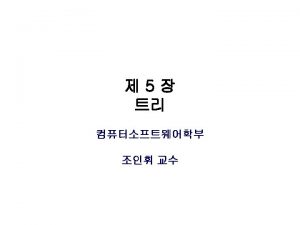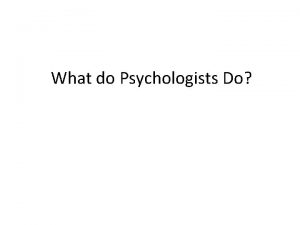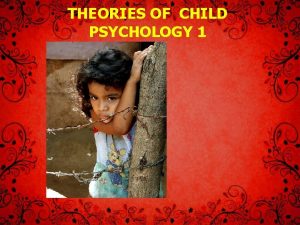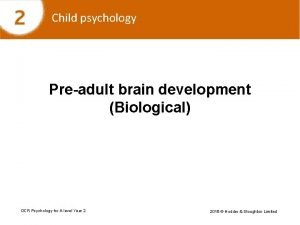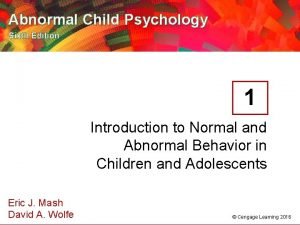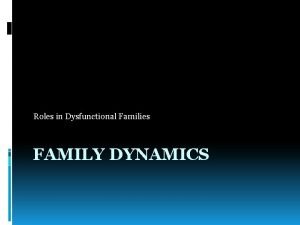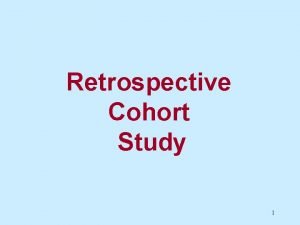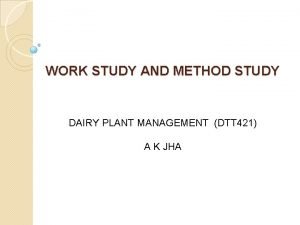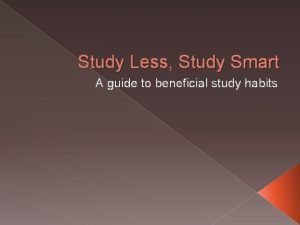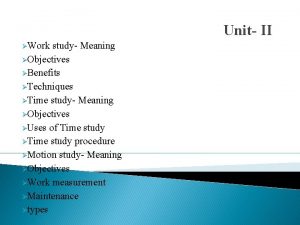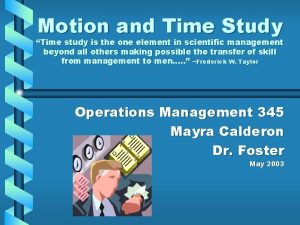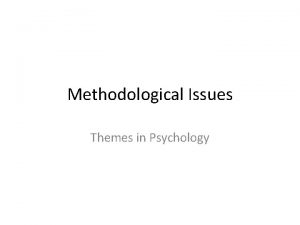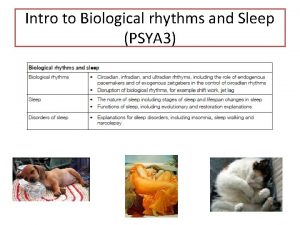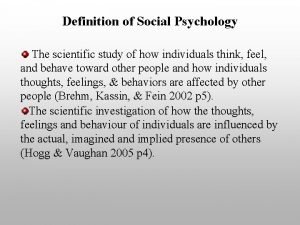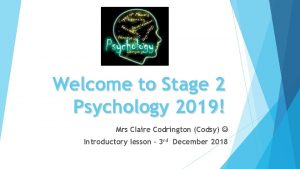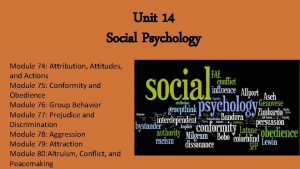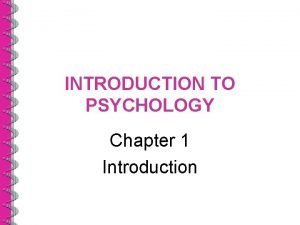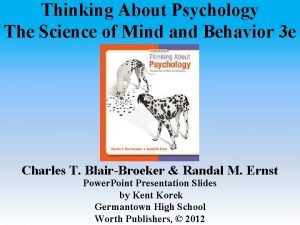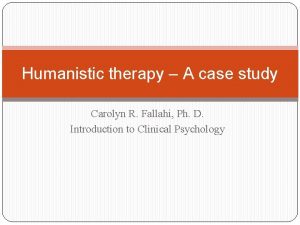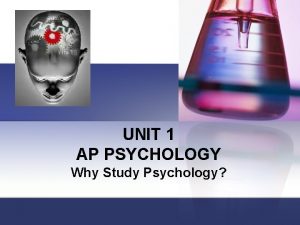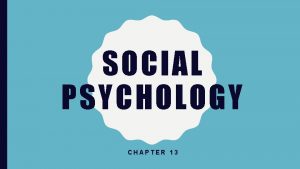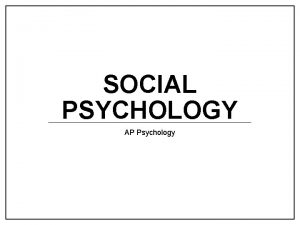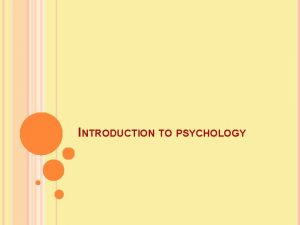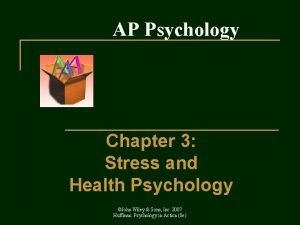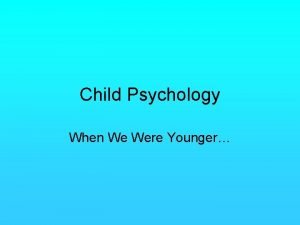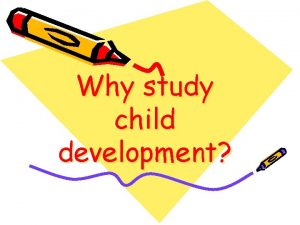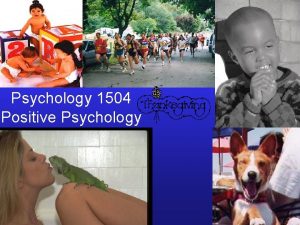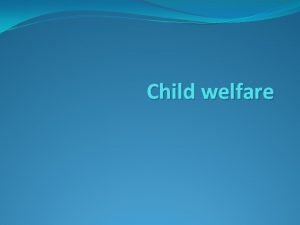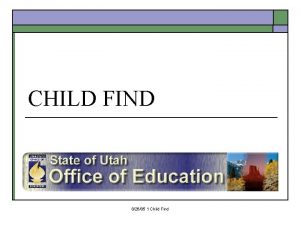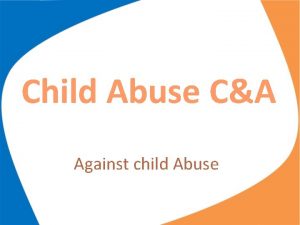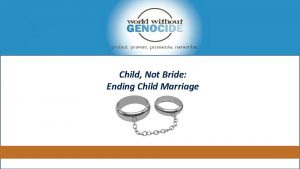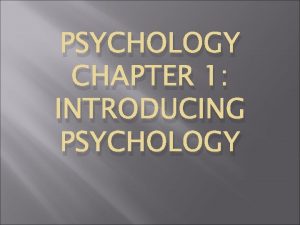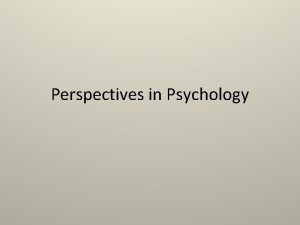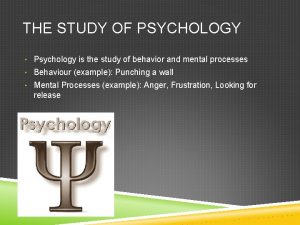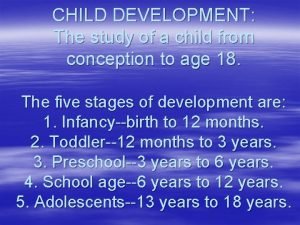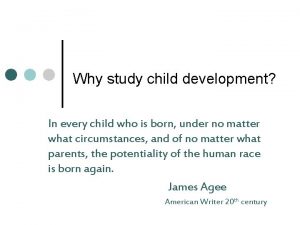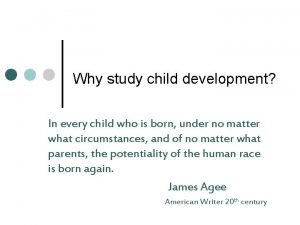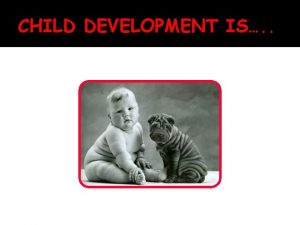CHILD PSYCHOLOGY Psychology Is the study of the





































































- Slides: 69

CHILD PSYCHOLOGY Psychology: Is the study of the mind or mental states and processes: the science of human nature.

CHILD PSYCHOLOGY DEFINITIONS/TERMS • CHILD PSYCHOLOGY: is the study of mental states and processes of children according to theories of psychology. • BEHAVIOR: is a way of acting and/or responding. • CAREGIVERS: are parents and/or others who take care of children. • PARENTHOOD: is the state of being a parent which begins when one has a child by birth or adoption.

CHILD PSYCHOLOGY DEFINITIONS/TERMS • Childhood: is a period of life separate from adulthood. • Adolescence: is the stage of life between childhood and adulthood. • Developmental Tasks: are challenges that must be met or a skill development at a particular stage of life. • Environment: is the people, place, and things that surround and influence a person.

CHILD PSYCHOLOGY DEFINITIONS/TERMS • Heredity: is the passing on of certain characteristics from an earlier generations. • Neurons: are nerve cells (axons/dendrites) • Self-esteem: is how you value yourself. The confidence and worth one feels about oneself, influences everything you do, think, feel, and are. • Sequence: is a step by step pattern.

Major Theorist in the field of Psychology Sigmund Shlomo Freud: Austrian Psychiatrist May 6, 1856 – September 23, 1939 Sigmund Freud (1856 -1939): Freud believed that personality develops through a series of stages. Emotional experiences in childhood have a profound effects on the person as an adult. Significance: “The idea that early experiences affect adult life has a profound importance for caring for a child. ”

Major Theorist in the field of Psychology B. F. Skinner (1904 – 1990): Skinner argued that when a child’s action repeatedly brings a positive effects, it will be repeated and learned. When negative results repeatedly occur, the child will eventually stop the action. Significance: “Parents and other caregivers can use rewards and punishments to try to influence a child’s behavior. ”

Abraham Maslow: An American Psychologist Maslow developed: “The Hierarchy of Human Needs” Maslow Theorized: That if a need is not met and/or satisfied then depression, boredom, and other mental disorders may result. Significance: If needs are met depression, boredom, and other mental disorders may/will not occur.

Abraham Maslow’s “Hierarchy of Human Needs” SELF-ACTULIZATION FULLMENT OF ONES POTENTIAL SYMETRY - ORDER ASTETIC – BEAUTY COGNATIVE TO KNOW – TO UNDERSTAND ESTEEM SELF ESTEEM – SELF WORTH TO ACHIEVE – TO GAIN APPROVAL TO LOVE – TO BE LOVED (GIVE AND RECEIVE) TO BELONG TO PART OF A GROUP SAFE – SECURE – OUT OF DANGER FOOD – CLOTHING - SHELTER

Maria Montessori 1870 - 1952 Finding: Montessori stressed that children Learn by using their senses and that they learn best by pursuing their interests. Maria Montessori: Italian Physician, Educator, Philosopher, and humanitarian. August 31, 1870 – May 6, 1952 Significance: Children need to be given objects to manipulate so they can exercise their sensory Learning.

Dr. Arnold Lucius Gesell: Psychologist and Pediatrician June 21, 1880 – May 29, 1961 Finding: Gesell developed basic information about the order in which children master various skills and the typical rate of this development. Significance: Parents and other caregivers need to be aware of the standard courses of development.

Jean Piaget 1896 – 1980 Finding: Piaget, the first to study children in a scientific way, focused on how children learn. He said that children through four stages of thinking that shape how they see and learn about the world. Significance: Children should be given learning tasks that are suitable for their stage of thinking.

Lev Semenovick Vygotsky: Developmental Psychologist November 17, 1898 - June 11, 1934 Findings: Vygotsky believed that both biological development and cultural experience influenced children’s ability to think and learn. Significance: Children should have many opportunities for social interaction to develop Intellectually.

Erikson 1902 - 1994 Findings: Erikson like Freud, said personality develops through stages. He thought that each stage includes a unique psychological crisis. If that crisis is met in a positive way, the individual will develop normally. Significance: Parents and other caregivers must be aware of a child’s needs at a particular stage and be sensitive to the child’s needs at that stage.

Albert Bandura 1925 – Canadian Psychologist Findings: Bandura said that children learn by modeling. He pointed out that although the environment shapes behavior, behavior also affects the environment. Significance: Since children learn by modeling, parents and caregivers must provide good examples.

Robert Coles 1929 – (Author – Medical Doctor - Child Psychologist) Findings: Coles has studied children’s moral development. He stresses the important role that parents and other caregivers play by the examples they set. Significance: For parents to adopt moral learning, parents must show moral behavior.

Theorist Major Focus/Concentration Personality Information: Freud - Erickson Intellectual Development: Montessori –Gesell – Piaget Vygotsky – Skinner - Bandura Social Development: Vygotsky – Bandura - Coles

THEORY v. sa v. LAW A Theory Hypothesis Test Hypothesis Evaluate Results Process Data Supports Disproves Interpret Data

Terms and Definitions • Anecdotal Record: A method of writing observations in which the observer writes down all the behaviors that have to do with one issue only. • Baseline: A frequency count taken before any step are taken to change the behavior being counted. • Confidentiality: Privacy • Developmental Checklist: A method of writing observations in which the observer identifies a series of specific skills or behaviors that a child of a certain age should master and checks off those that observed in a particular child. • Frequency Count: A method of writing observations in which the observer tallies how often a certain behavior occurs. • interpret: To fine meaning in, explain, or make sense of something. • Objective: Using facts not personal feelings or prejudices, to describe things. • Running Record: A method of writing observations in which the observer writes down for a set period of time everything observed about a particular child, group, or teacher. • Subjective: Using personal opinions or feelings, rather then the facts, to judge or describe things.









FACTORS TO BE CONSIDERED Agree on critical issues Share common interests and activities Demonstrate affection and shared confidences BE A FRIEND!!!!!! IMPORTANT CONSIDERATIONS Similarity in family backgrounds Domestic happiness of parents Lack of conflict with parents Educational achievements of both parents Friends of both sexes Participation in organizations Close association prior to marriage Security and stability of occupation Religion

MARRIAGE AND MATURITY “A mature person can and/or is: ” Establish and maintain relationships Give as well as receive Compromise and accept not always getting his or her own way Be flexible Be responsible for their feelings and actions Stable Establish values and live by them Set goals and plans to achieve them `Aware of their needs and the healthy way to meet them, and does not expect their spouse or marriage to meet all of these needs

TEEN MARRIAGE (Good V – SA - V Bad? ? ? ) FACTORS TO BE CONSIDERED §Females between the ages of 14 and 17 who marry are twice as likely to divorce as those who wait till they are 18 or 19 and three times as likely to divorce than those who wait till they are 20 – 24 § 80% of teenage couples who get married because of pregnancy are divorced with six (6) years § Couples with low incomes and little education are more likely to divorce than other groups. Teens who marry often fall into both categories § Couples in which neither has a high school diploma are more likely to divorce then couples in which both have college degrees

CONFLICTS IN MARRIAGE


NUCLEAR FAMILY (MOTHER – FATHER – CHILD) Single Parent Mother or Father and a Child Blended Family (When a single parent marries another)

§ ADOPTION: A legal process by which children enter a family they were not born into. § EXTENDED FAMILY: A family group that includes relatives other than a parent and child who live with them. § FAMILY LIFE CYCLE: A series of stages that families live through. §FOSTER CHILD: Children who enter a family temporary because they need a home until their parents can solve their problems or until the children can find a permanent adoptive home. §GUARDIAN: Adult who takes all financial and legal responsibility for raising a child when the child’s parents die.

Aptitudes: A person special talents and/or abilities. § Entry –level job: A position in the field for beginners, one which requires limited education and training. § Life Long learner: A person who spends their life learning new information and skills. § Paraprofessional: A worker with and education beyond high school that trains them for a certain field. § Professional: A worker who has a degree from a four year college or technical school in a particular field. § Service Learning: A program that combines some form of community service with schoolwork. § Systems: A complex networks of people or objects that interact with each other. § Work Environment: The physical and social surroundings at the workplace. § Work-based Learning: A program in which students combine in-school and on-the-job learning. §


Parenthood: The state of being a parent, which begins when one has a child by birth and/or adoption. Emotional Maturity: Being responsible enough to consistently put someone else’s needs before your own. 1 Pgs Glossary

o Authoritarian Style: A parenting style based on the idea that children should obey their parents without question. o Democratic Style: A parenting style in which parents allow children some input into rules and limits put on their behavior. o Permissive Style: A parenting style in which parents give the children a wide range of freedom, with children being able to set their own rules. o Deprivation: The lack of an enriching environment. o Nurturing: Giving a child opportunities for encouragement and enrichment and showing love, support, and concern for the child. o Parenting: Caring for a children and helping them develop. 1 Pgs Glossary

Having a child will add depth to our relationship, which is already strong. § I want to give a baby my care and my love. § I feel good about myself and believe that parenthood will be a rewarding experience. § I want to experience the special bond between parent and child, which last a lifetime. § I love children, and I want to be a parent. § 1 P - 74

A baby is someone who will love me and belong to me. I want someone who will take care of me when I am old. I feel I am nobody. Being a parent will make me somebody. Our parents want grandchildren Our marriage is in trouble. Maybe a baby will solve our problems. 1 P - 74

BEGINNING STAGE: A couple works to establish a home and a marriage relationship. RETIREMENT: The couple retires and adjusts to their new lives. PARENTAL STAGE ONE Expanding: The couple prepares to adjust to parenthood. MIDDLE AGES: The couple renews their relationship and prepares for retirement. If they had children who have left home, this is called the “empty nest” stage. PARENTAL STAGE TWO Developing: As children grow, parents work to meet children’s Needs and help them develop independence. PARENTAL STAGE THREE Launching: Children gradually leave the home to support themselves. Parents help their children adapt to life on their own.

PARENTING THROUGH THE LIFE CYCLE

The Human Brain The Parts of the Brain • Cerebrum contains centers for memory, intelligence, emotions, speech, hearing, and vision. • Cerebellum contains centers that controls muscle movement. • Mid-Brain and Pons serve primarily as connecting stations for the brain. • Medulla Oblongata contains centers for heart beat and respiration.


The Nerve Cell Function § Axon takes message from one nerve to another. § Dendrites receives the messages from an axon from another cell. Nota Bene: The axon and dendrite do not touch there is a gap between them. this gap is a bridged by a synapse facilitated by a chemical known as Acetylcholine which is active in the transmission of nerve impulses. The Nerve Cell

WHEN THE BRAIN IS READY TO LEARN Math and Logic: Starting at age one Vision: in the first year Vocabulary: Starting in the first year Research Findings Indicate Acquiring a second language: Starting at age one Emotional control: Starting in the first year Motor development: Starting before birth Music: Starting at age three Social attachment: Starting in the first year

PARENTING/CAREGIVER ACTIONS Talk, read, sing to your child Limit Television watching Establish routines, and rituals Be Warm And Responsive Encourage safe Exploration and play Use discipline as a opportunity to teach Choose quality child care and stay involved Recognize that each child is unique

Wolfgang Amadeus Mozart What is a Child Prodigy A child prodigy is someone who at an early age masters one or more skills at an adult level. One criterion for classifying prodigies is: a prodigy is a child, typically younger than 15 years old, who is performing at the level of a highly trained adult in a very demanding field of endeavour.

A Big sister can be a role model A Role Model is a person that someone admires and/or wishes to pattern his or her behavior after. A father figure can be a friend or teacher or even the neighborhood grocer.


Play is how children learn and experience their world Psychologist Dr. Bruno Bettelheim says that parents need to take an active interest in children's play “give play not just respect and tolerance but also their personal interest”.








The loving reassurance that come with in hugs. Music and rhythm. Being read to. An environment that is safe and healthy. A place where they are safe can explore and learn. A relationship with a care givers that lasts. Communication by talking and gestures. 1 – P 71 A chance to hear and see other people. Praise, to build their self-esteem. Opportunities to play so that they can learn.

Commitment: Each family member feels commitment to the family as a whole and to each other member. Making time together: By spending time together members build strong bonds. Communication: Family members need to tell each other what they think and feel and they need to be considerate of others members thoughts and feelings too. 1 P - 76 Appreciation: People in healthy families Like each other and say so. Shared Beliefs: Healthy families Build their strong relations on a Foundation of shared beliefs.

Use words a child can understand. Be positive and polite. 1 P - 86 Give praise and love. Be Clear.

Positive Reinforcement: A response That will encourage a particular Behavior So that it will be repeated Self-discipline: Children’s ability to control their own behavior, learned through guidance. Negative reinforcement: A response aimed Discouraging a child from repeating a behavior. Conscience: The inner sense of what is right. Time out: Is a short period of time which a child sets away from other people And the Guidance: Using firmness and understanding center of activity. To help children learn to control their behavior. 1 Pgs. Glossary

Use specific words. Make sure you have their attention. Begin with an action Verb. Use positive statements. Use a pleasant voice. Give only one direction at a time. 1 P

Providing Sound Guidance is using firmness and understanding to help the child to learn to control their behavior. Good guidance helps the child achieve Self-discipline, (to control their behavior), and the development of a Conscience or an inner self Being Consistent Consistency is a matter of clearly making rules and applying them in the same way in all situations. Encouraging Appropriate Behavior Setting Good Examples --- Telling what is Expected Praising Appropriate Behavior or Positive Reinforcement Offering Choices Setting Limits should be designed to allow the child to learn, be of benefit, be safe, be fair, and age appropriate. When Making Limits Clear Show Understanding – Acknowledge the Child’s Feelings – Give Alternatives

Key Questions: Is the behavior developmentally appropriate and does the child understand? ? ? Unintentional Misbehavior With unintentional misbehavior explanations rather then punishment is best i. e. spilling milk. Using Punishment Effectively Punishment is negative reinforcement designed to discourage the child from repeating the behavior. Some Useful Techniques: § Natural Consequences § Loss of Privileges §Giving Time-out § Use Words § Speak Calmly § Count to ten

Bribing Shouting or Yelling Shamming or Belittling Making children promise to behave Threatening to withhold Love

Accreditation: A formal process in which the National Association for the Education of Young Children reviews a child care facility’s staff, programs, and environment to see if they meet the association’s strict standards. Licenses: A document issued by the state which shows that the caregivers meet the health and safety standards. Child Care Center: A facility in which the staff provides care for children whose parents are not available during working hours. Family Child Care: A child care situation in which an adult cares for a small number of children in his or hers own home. Head Start: A federal government program that sets up locally run child care facilities designed to help lower-income and disadvantaged children improve their readiness for school. Montessori preschool: A facility for the education of children aged three to five that uses special learning materials and follows the ideas of Dr. Maria Montessori. Nanny: Trained worker hired by a family to provide live-in child care. Parent Cooperative: A child care situation in which part of the care is provided by the parents of the children in the program. Play Group: A child care arrangement in which parents take turns caring for each other’s children in their own homes. Preschool: A facility that provides programs for children aged three to five.



 Left child right sibling
Left child right sibling Types of child psychology
Types of child psychology Developmental stage theories
Developmental stage theories Types of child psychology
Types of child psychology Types of child psychology
Types of child psychology Abnormal child psychology 6th edition
Abnormal child psychology 6th edition Roles in a dysfunctional family
Roles in a dysfunctional family Case series
Case series Retrospective cohort study vs prospective cohort study
Retrospective cohort study vs prospective cohort study Work study technique
Work study technique Study less study smart
Study less study smart Phytogeographical regions of world
Phytogeographical regions of world Time study meaning
Time study meaning Time and motion study example ppt
Time and motion study example ppt Hát kết hợp bộ gõ cơ thể
Hát kết hợp bộ gõ cơ thể Ng-html
Ng-html Bổ thể
Bổ thể Tỉ lệ cơ thể trẻ em
Tỉ lệ cơ thể trẻ em Voi kéo gỗ như thế nào
Voi kéo gỗ như thế nào Glasgow thang điểm
Glasgow thang điểm Hát lên người ơi alleluia
Hát lên người ơi alleluia Các môn thể thao bắt đầu bằng tiếng nhảy
Các môn thể thao bắt đầu bằng tiếng nhảy Thế nào là hệ số cao nhất
Thế nào là hệ số cao nhất Các châu lục và đại dương trên thế giới
Các châu lục và đại dương trên thế giới Công của trọng lực
Công của trọng lực Trời xanh đây là của chúng ta thể thơ
Trời xanh đây là của chúng ta thể thơ Cách giải mật thư tọa độ
Cách giải mật thư tọa độ Làm thế nào để 102-1=99
Làm thế nào để 102-1=99 Phản ứng thế ankan
Phản ứng thế ankan Các châu lục và đại dương trên thế giới
Các châu lục và đại dương trên thế giới Thơ thất ngôn tứ tuyệt đường luật
Thơ thất ngôn tứ tuyệt đường luật Quá trình desamine hóa có thể tạo ra
Quá trình desamine hóa có thể tạo ra Một số thể thơ truyền thống
Một số thể thơ truyền thống Cái miệng nó xinh thế
Cái miệng nó xinh thế Vẽ hình chiếu vuông góc của vật thể sau
Vẽ hình chiếu vuông góc của vật thể sau Nguyên nhân của sự mỏi cơ sinh 8
Nguyên nhân của sự mỏi cơ sinh 8 đặc điểm cơ thể của người tối cổ
đặc điểm cơ thể của người tối cổ V cc cc
V cc cc Vẽ hình chiếu đứng bằng cạnh của vật thể
Vẽ hình chiếu đứng bằng cạnh của vật thể Tia chieu sa te
Tia chieu sa te Thẻ vin
Thẻ vin đại từ thay thế
đại từ thay thế điện thế nghỉ
điện thế nghỉ Tư thế ngồi viết
Tư thế ngồi viết Diễn thế sinh thái là
Diễn thế sinh thái là Các loại đột biến cấu trúc nhiễm sắc thể
Các loại đột biến cấu trúc nhiễm sắc thể Thế nào là số nguyên tố
Thế nào là số nguyên tố Tư thế ngồi viết
Tư thế ngồi viết Lời thề hippocrates
Lời thề hippocrates Thiếu nhi thế giới liên hoan
Thiếu nhi thế giới liên hoan ưu thế lai là gì
ưu thế lai là gì Hổ đẻ mỗi lứa mấy con
Hổ đẻ mỗi lứa mấy con Sự nuôi và dạy con của hổ
Sự nuôi và dạy con của hổ Sơ đồ cơ thể người
Sơ đồ cơ thể người Từ ngữ thể hiện lòng nhân hậu
Từ ngữ thể hiện lòng nhân hậu Thế nào là mạng điện lắp đặt kiểu nổi
Thế nào là mạng điện lắp đặt kiểu nổi Neurotransmitters psychology
Neurotransmitters psychology Snapshot study psychology
Snapshot study psychology Michel siffre cave study psychology
Michel siffre cave study psychology Social psychology definition psychology
Social psychology definition psychology Psychology sasta 2019 study guide
Psychology sasta 2019 study guide Group polarization vs groupthink
Group polarization vs groupthink Correlational studies
Correlational studies Psychology should only study observable behaviors
Psychology should only study observable behaviors Humanistic case conceptualization example
Humanistic case conceptualization example Positive psychology ap psychology definition
Positive psychology ap psychology definition Ap psychology chapter 13 social psychology
Ap psychology chapter 13 social psychology Fundamental attribution error ap psychology
Fundamental attribution error ap psychology Explain methods of psychology
Explain methods of psychology Health psychology definition ap psychology
Health psychology definition ap psychology
